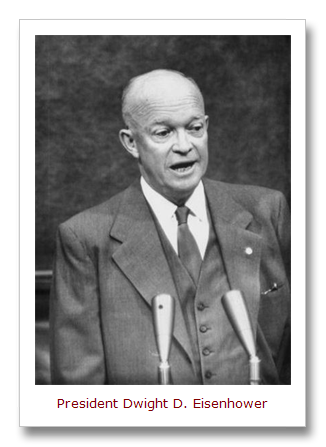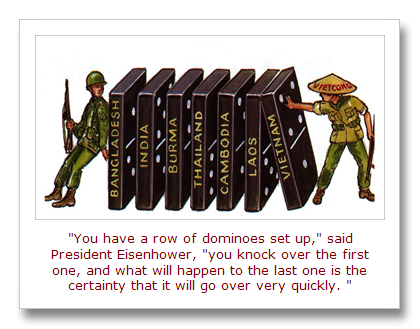Contrary to what many sites on the Internet say, President Dwight D. Eisenhower did not coin the famous Cold War term “the Domino Effect.”
He did use the phrase “falling domino principle” in a famous press conference on April 7, 1954.
Journalists at the time dubbed this “The Domino Theory,” which later came to be referred to as “the Domino Effect.”
The political concept encapsulated by those terms — the idea that if one country fell to the control of Communists, then nearby countries could follow — was a major foundation of America’s foreign policy during the Cold War years, which lasted from 1947 until the dissolution of the Soviet Union in 1991.
This concern was initially raised by President Truman’s Undersecretary of State, Dean Acheson.
In 1947, the government of Greece faced threats from Communist insurgents and Turkey seemed to be falling under the sway of the Soviet Union. Acheson warned in various public statements that, if the “Reds” took over in Greece and Turkey, Communism would likely spread south to Iran and as far east as India.
To counter this threat, President Truman asked Congress to approve $400 million in military and economic assistance for Greece and Turkey and proposed an anti-Communist policy eventually referred to as “The Truman Doctrine.”
“It must be the policy of the United States,” Truman explained in a high-profile speech to Congress, “to support free peoples who are resisting attempted subjugation by armed minorities or by outside pressures.”
President Eisenhower, Truman’s successor, agreed with the Truman Doctrine’s goal of containing the spread of Communism. And, early in his first term in office, he was forced to consider the need to apply that doctrine to Southeast Asia.
By 1954, France was on the verge of losing control of its colony Indochina (later called Vietnam) to Communist insurgents led by Ho Chi Minh. Eisenhower and his administration worried that if Indochina fell to Communist control, other Southeast Asian countries would follow.
During a White House press conference on April 7, 1954, reporter Robert Richards of the Copley Press asked Eisenhower: “Mr. President, would you mind commenting on the strategic importance of Indochina for the free world? I think there has been, across the country, some lack of understanding on just what it means to us.”
Eisenhower famously responded:
“You have, of course, both the specific and the general when you talk about such things. First of all, you have the specific value of a locality in its production of materials that the world needs.
Then you have the possibility that many human beings pass under a dictatorship that is inimical to the free world.
Finally, you have broader considerations that might follow what you would call ‘the falling domino principle.’ You have a row of dominoes set up, you knock over the first one, and what will happen to the last one is the certainty that it will go over very quickly. So you could have a beginning of a disintegration that would have the most profound influences.”
Eisenhower said this disintegration would lead to the “loss of Indochina, of Burma, of Thailand, of the Peninsula, and Indonesia following.”
In many news stories, reporters referred to Eisenhower’s falling domino principle as “the Domino Theory” or as “the Domino Effect.” The latter was a term that journalists Joseph and Stewart Alsop used in their popular syndicated newspaper column and claimed to have coined.
A month after Eisenhower made his famous remarks in 1954, Vietminh forces under General Vo Nguyen Giap defeated French troops at the Battle of Dien Bien Phu.
France soon ceded control of its former colony. And, under an agreement hammered out in Geneva, Indochina was partitioned into Communist-controlled North Vietnam and non-Communist South Vietnam.
In the following years, Eisenhower provided economic assistance and weapons to the fledgling South Vietnamese government and sent in a small number of American military advisors.
During the early 1960s, President John F. Kennedy significantly expanded U.S. economic and military assistance to South Vietnam and increased the number of military advisors there to more than 16,000.
These decisions by Eisenhower and Kennedy set in motion a political and military domino effect that ultimately led to the Vietnam War.
* * * * * * * * * *
Comments? Corrections? Questions? Email me or post them on my Famous Quotations Facebook page.
Related reading and viewing…











